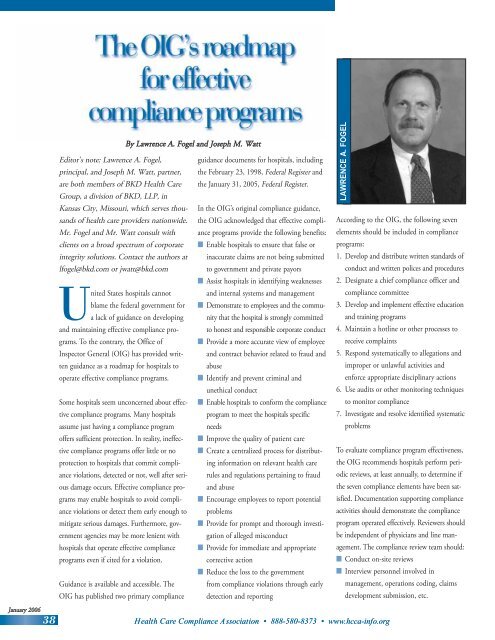MD - Health Care Compliance Association
MD - Health Care Compliance Association
MD - Health Care Compliance Association
Create successful ePaper yourself
Turn your PDF publications into a flip-book with our unique Google optimized e-Paper software.
By Lawrence A. Fogel and Joseph M. Watt<br />
Editor’s note: Lawrence A. Fogel, guidance documents for hospitals, including<br />
principal, and Joseph M. Watt, partner, the February 23, 1998, Federal Register and<br />
are both members of BKD <strong>Health</strong> <strong>Care</strong> the January 31, 2005, Federal Register.<br />
Group, a division of BKD, LLP, in<br />
Kansas City, Missouri, which serves thousands<br />
of health care providers nationwide. the OIG acknowledged that effective compli-<br />
In the OIG’s original compliance guidance,<br />
Mr. Fogel and Mr. Watt consult with ance programs provide the following benefits:<br />
clients on a broad spectrum of corporate ■ Enable hospitals to ensure that false or<br />
integrity solutions. Contact the authors at inaccurate claims are not being submitted<br />
lfogel@bkd.com or jwatt@bkd.com<br />
to government and private payors<br />
■ Assist hospitals in identifying weaknesses<br />
United States hospitals cannot and internal systems and management<br />
blame the federal government for ■ Demonstrate to employees and the community<br />
that the hospital is strongly committed<br />
a lack of guidance on developing<br />
and maintaining effective compliance programs.<br />
To the contrary, the Office of ■ Provide a more accurate view of employee<br />
to honest and responsible corporate conduct<br />
Inspector General (OIG) has provided written<br />
guidance as a roadmap for hospitals to abuse<br />
and contract behavior related to fraud and<br />
operate effective compliance programs. ■ Identify and prevent criminal and<br />
unethical conduct<br />
Some hospitals seem unconcerned about effective<br />
compliance programs. Many hospitals program to meet the hospitals specific<br />
■ Enable hospitals to conform the compliance<br />
assume just having a compliance program needs<br />
offers sufficient protection. In reality, ineffective<br />
compliance programs offer little or no ■ Create a centralized process for distribut-<br />
■ Improve the quality of patient care<br />
protection to hospitals that commit compliance<br />
violations, detected or not, well after seri-<br />
rules and regulations pertaining to fraud<br />
ing information on relevant health care<br />
ous damage occurs. Effective compliance programs<br />
may enable hospitals to avoid compli-<br />
■ Encourage employees to report potential<br />
and abuse<br />
ance violations or detect them early enough to problems<br />
mitigate serious damages. Furthermore, government<br />
agencies may be more lenient with gation of alleged misconduct<br />
■ Provide for prompt and thorough investi-<br />
hospitals that operate effective compliance ■ Provide for immediate and appropriate<br />
programs even if cited for a violation.<br />
corrective action<br />
■ Reduce the loss to the government<br />
Guidance is available and accessible. The from compliance violations through early<br />
OIG has published two primary compliance detection and reporting<br />
LAWRENCE A. FOGEL<br />
According to the OIG, the following seven<br />
elements should be included in compliance<br />
programs:<br />
1. Develop and distribute written standards of<br />
conduct and written polices and procedures<br />
2. Designate a chief compliance officer and<br />
compliance committee<br />
3. Develop and implement effective education<br />
and training programs<br />
4. Maintain a hotline or other processes to<br />
receive complaints<br />
5. Respond systematically to allegations and<br />
improper or unlawful activities and<br />
enforce appropriate disciplinary actions<br />
6. Use audits or other monitoring techniques<br />
to monitor compliance<br />
7. Investigate and resolve identified systematic<br />
problems<br />
To evaluate compliance program effectiveness,<br />
the OIG recommends hospitals perform periodic<br />
reviews, at least annually, to determine if<br />
the seven compliance elements have been satisfied.<br />
Documentation supporting compliance<br />
activities should demonstrate the compliance<br />
program operated effectively. Reviewers should<br />
be independent of physicians and line management.<br />
The compliance review team should:<br />
■ Conduct on-site reviews<br />
■ Interview personnel involved in<br />
management, operations coding, claims<br />
development submission, etc.<br />
January 2006<br />
38<br />
<strong>Health</strong> <strong>Care</strong> <strong>Compliance</strong> <strong>Association</strong> • 888-580-8373 • www.hcca-info.org

















